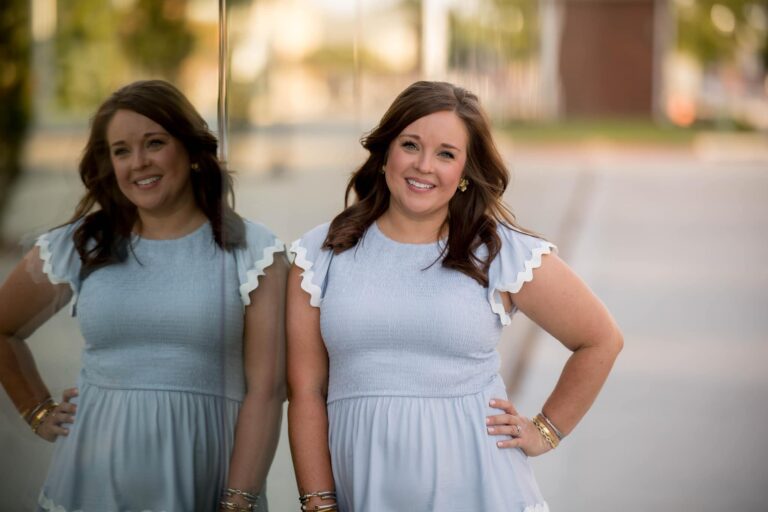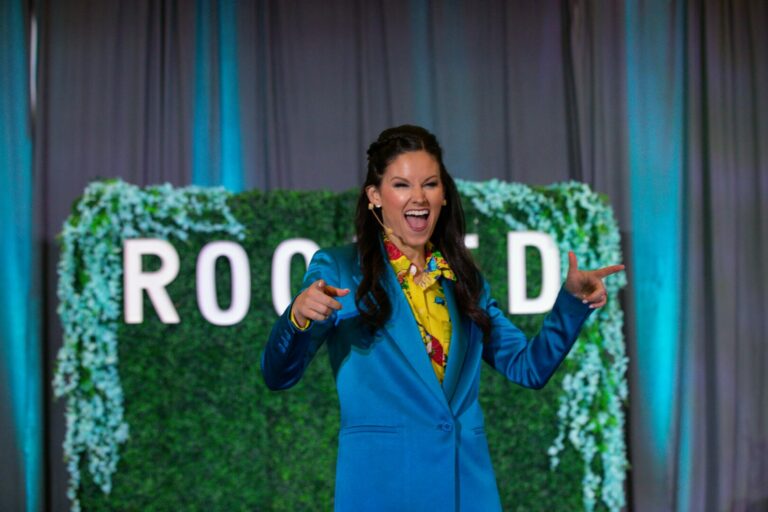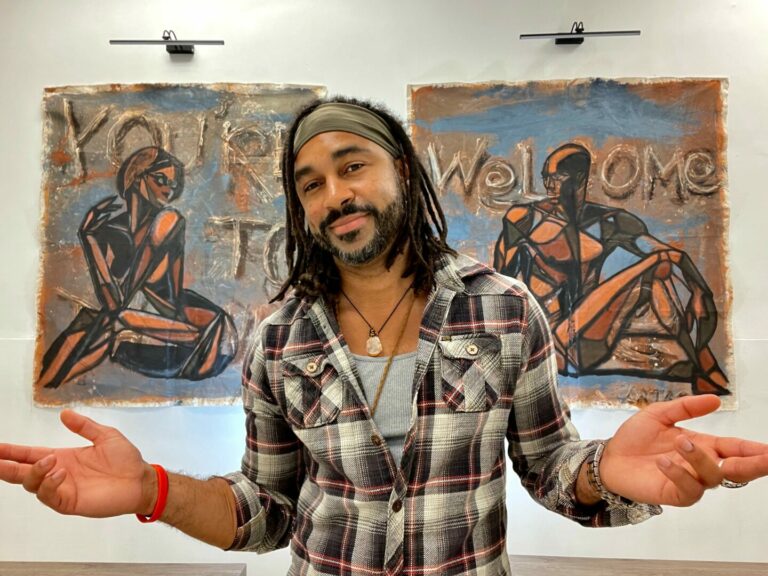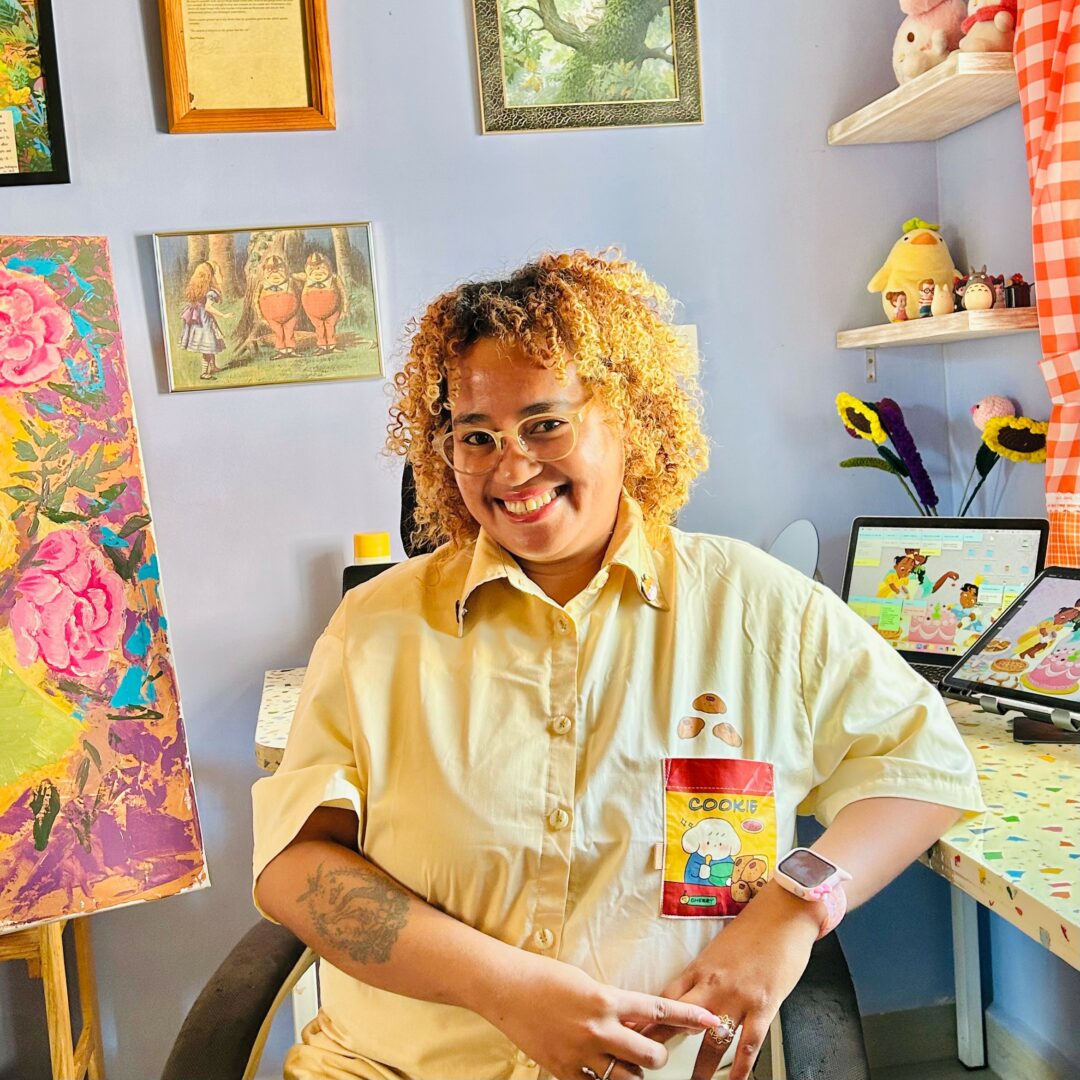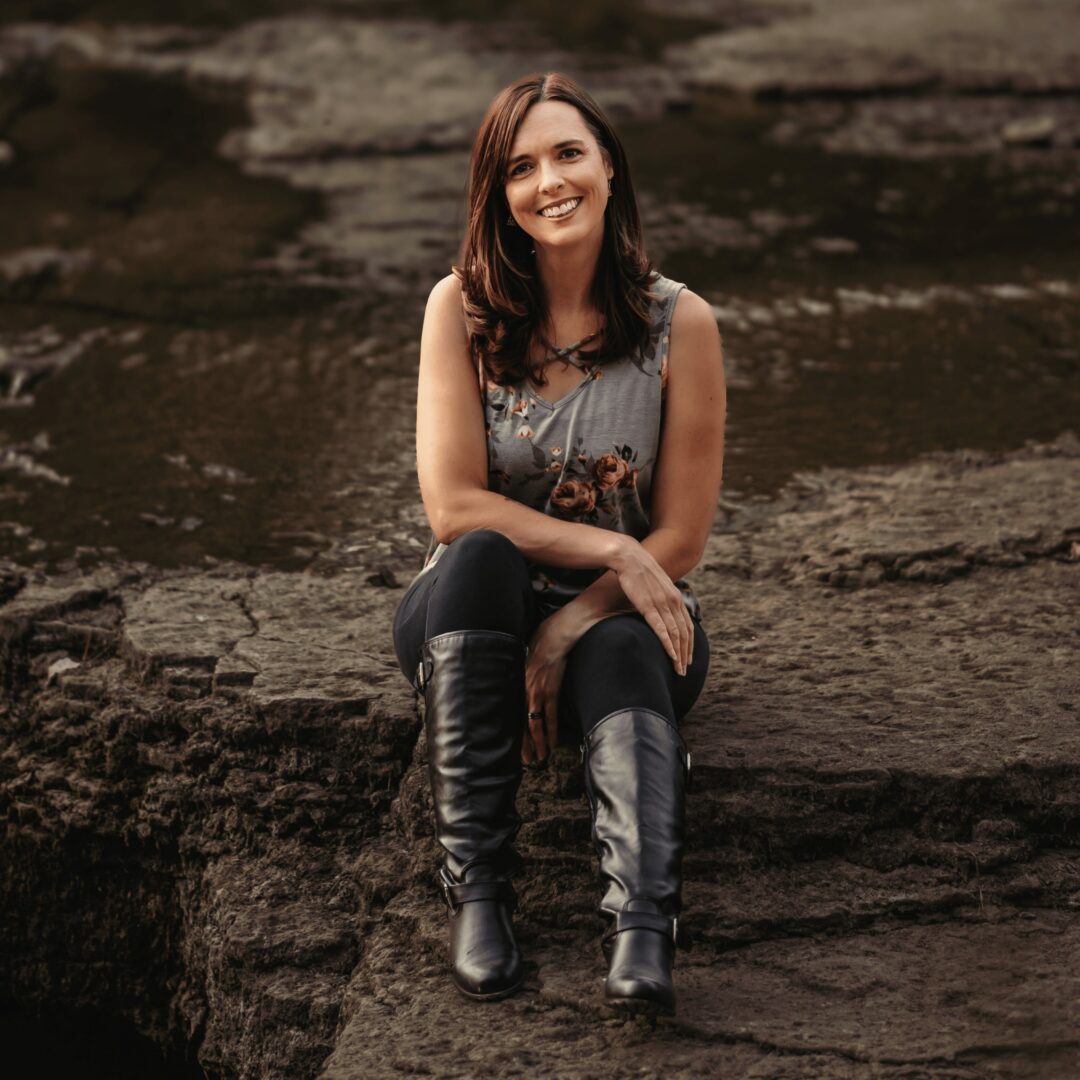Self-doubt and imposter syndrome have stopped far too many talented folks from going for their goals and reaching their true potential. Our hope is to host conversations that inspire folks to overcome imposter syndrome and help others as well.
Megan Burtt

I’m not sure anyone ever overcomes the feeling that they could be making art or impact at a high level. I think the more honest I’ve gotten in my songwriting the more confident I feel presenting it and that softens those feelings a bit. I also like putting myself in growth situations. I don’t ever want to be the best musician in the room. A little imposter syndrome is good inspiration if you’re able to not let it stop you in your tracks. Read more>>
Gina-Marie Bethel

Firstly I was honest with myself and recognized certain triggers. For me, I’m a perfectionist and a bit of an introvert so with that I had to overcome self doubt, over working and comparing myself to others in the industry and overall fear of exposure. In being honest with myself; I realized that it was important to reshape my though process and challenge negative thoughts of inadequacy and to celebrate my achievements no matter how small I viewed them. Talking to others also played a major role in winning the battle with imposter syndrome. Chatting with like minded industry professionals and mentors who knew exactly what I was faced with and assisted in me clearing my own path to success. Read more>>
Deanna Robinson

This is an extremely hard question to answer because honestly, I still struggle with imposter syndrome. Every day I wake up feeling like I don’t deserve the life I’m building or the accolades I receive. Then I think about it—really think about it—and realize that I work my butt off. I’m in the shop six to seven days a week, sometimes working through the night without sleep. I’m constantly searching for new events to participate in and different ways to get my name and product out there. It’s not that I’ve overcome imposter syndrome; it’s that I continue to move forward and grow in spite of it. Read more>>
Wenjue Lu

As an artist and designer, overcoming imposter syndrome has been a significant part of my journey. The moment I came into contact with “Sashiko,” a traditional Japanese hand-sewing technique, it felt like a profound connection. Sashiko embodies everything I’ve always hoped to express in my work: it is slow, artisanal, and subtle. This realization helped me ground myself in my artistic identity and reinforced my belief in the value of my creative approach.Amid a noisy environment, Sashiko allowed me to immerse myself in the interrelationship of people, needles, threads, and cloth. The elegance and naturalness of hand stitching, the concentration, and harmony between them all, fascinated me. This art originated from simple folk life, used initially as a technique for reinforcing fabrics and mending holes. It carried the warmth of family and the hardships of labor. As Sashiko entered modern aesthetics, it became popular in society, endowed with a renewed attitude and life. This transformation resonated deeply with my own evolution as a designer. Growing up in Beijing and studying sketching as a child left a deep imprint on my creative world. This background allowed me to focus on nuances, especially on varied shades and tones and the deep depiction of still life. My experience at Parsons in New York broadened my exposure to various mediums, enabling me to explore accessories, space installations, still lifes, furniture, and toys. This diversity helped me find my own design language and strengthened my confidence in my unique perspective. Read more>>
Jessica Sennett

I think a healthy dose of self-reflection and a humble demeanor is a better way to live and forge relationships in this life. However, that doesn’t mean that you don’t have to advocate for yourself and your ideas. When doing something innovative or niche, there will be a lot of naysayers at the beginning, so you need to constantly remind yourself that you have the knowledge, creativity, and insight to develop a new product, listen to the feedback received, and do everything you can stand 100% behind the quality of what you are making. This is how I developed the Cheese Grotto storage line and brand. Read more>>
Iman Nazemzadeh

As I was scrolling through the questions, this one stuck out cause I think at some point or another we are all challenged to face the question “do I know enough to speak on this? And will they believe me?” Imposter syndrome comes from a mind fear that quietly whispers “I’m not worthy”. To dispel this view I’ve learned to put the attention on the benefits others will receive that is more important than a self that believes it’s not worthy or enough. We don’t walk around all day with this syndrome believing, “this is who I am, intrinsically.” Understanding that we have so many aspects to us and that we aren’t one thing always at any given time helps me to not follow that voice and instead redirect my attention and energy to a voice that works for me and ultimately will benefit others. Sitting in meditation with the feeling of this fear without indulging in it or spinning a story has given me space around it and helps me further investigate where the feeling is coming from and “who” is having this feeling. Another method is to simply do your homework, preparation and research which may include getting support from someone who can assist you, so that you’re not left feeling like you’re carrying such a huge responsibility. One last thing… the beginners mind is essential to have at any stage of any profession. It invites curiosity and leaves a person open to continue learning. The teacher and student are interchangeable. Read more>>
Michele Locke

I hate to say it, but impostor syndrome is a persistent companion in my professional journey — it has never really gone away. Instead, it’s a constant challenge that I have had to learn how to navigate. My approach to handling my imposter syndrome has evolved over time. At the very core of my approach is simply to keep moving forward, putting one foot in front of the other, working hard to be prepared, and knowing that I just have to go do it. This persistence is driven by a deep-seated need to continue working, growing, improving, and excelling at whatever task is in front of me. Impostor syndrome thrives on self-doubt, but it can also catalyze continuous improvement. Balancing the logical mind with gut instincts helps in managing these feelings. While my head might be filled with doubts, my gut often reassures me that I am capable. This internal battle between head and gut is a driving force, pushing me to hone my skills and trust in my abilities. My job isn’t one where I can second-guess myself often; my work in family law demands that I think and act quickly in the moment. Ultimately, overcoming impostor syndrome is about grit and determination to get the job done and understanding that sometimes it’s okay to feel like an impostor. Oftentimes the imposter syndrome drives me to do better. My concerns and desires to truly help my clients helps drive me past that imposter syndrome because I have to do my best in order for my clients and their children to have the best possible outcomes. It’s a sign that I constantly challenge myself and strive to improve. By continuously putting in the effort, learning from each experience, and trusting my instincts, personal and professional growth is inevitable. I was fortunate enough to be able to use the Imposter Syndrome to help me get to where I am today. Read more>>
Mandy Jeanne

Imposter Syndrome is very real. When I began reading Tarot professionally 20 years ago, I started slow with friends and family, eventually branching out to small private events, as I built my client base. I had printed some simple business cards with my name and email below a wispy heading that read: Tarot Readings. Although I had been learning and studying the cards since I was 11 years old, I still found myself with “stage fright”. Usually, these butterflies dissipated once the session found its footing. Nothing could have prepared me for my first convention, however. I had been to several Metaphysical Fairs in the past, and I desperately wanted to be amongst the other purveyors of Spiritual Counsel. I had so much to give, and I wanted to share it with everyone. So I signed up for a booth at the largest and most respected conference in my area- a full weekend of Reading, fully immersed in and around people I looked up to and those I wanted to help. I got checked by reality real quick. Setting up the night before opening day was alarming. Of course, having been to these summits in the past, I knew visually what others’ displays and layouts looked like, but I immediately felt out of place with my hand painted sign on an old easel, and severe lack of extra adornments. I had no table banner, no neatly printed posterboard with details, not even a windchime. Not only did I stick out like a sore thumb, I was nearly invisible. Read more>>
Daljit Kaur

When I was 13, my parents made a life-changing decision to move me from a village school to a larger institution to provide me with a brighter future. Until then, I had studied in Punjabi, my mother tongue, and was considered one of the top students. Suddenly, I found myself in a big building surrounded by kids who only spoke English. This marked the beginning of my journey with imposter syndrome and feeling out of place. Being raised with a perfectionist mindset only added to the challenge. The first two years were incredibly tough. The kids around me made sure I felt like an outsider, which led to feelings of inadequacy, fear, and nervousness. This experience laid the foundation for my imposter syndrome. In my first year, I tried to hide and keep quiet, often experiencing anxiety just thinking about going to school. However, knowing my parents were investing all their hard-earned money in my education gave me the strength and purpose to persevere. To cope, I turned to my mother’s faith and surrendered myself to God. I asked for God to be my champion and friend, which gave me the inner strength to face each day with confidence. Believing I was not alone, and that God would protect me, helped me navigate that challenging phase of my life. Read more>>
Erika Stearly

There’s an idea that if you are starting out in a creative field, you should aim for 100 rejections a year. The thought is that one cannot be rejected that many times without putting in the effort to pursue to that many opportunities. And surely, some opportunity will work out for you. I endeavored to do this for 2 or 3 years – I applied for artist residencies, grants, exhibitions, and academic jobs. I was always about a dozen or so short of 100. I fell out of the habit because eventually I found people who said yes to me. I began creating opportunities on my own to keep myself occupied, and eventually I found myself integrated with the community I wanted to belong to. I still feel unsure of myself sometimes, I feel impatient that things aren’t happening as quickly as I want them too. I can be envious of the accomplishments of other people, though I don’t believe their success comes at my expense. But I no longer doubt whether or not I am supposed to be here. Read more>>
Lawrence Williams Jr

Imposter syndrome still creeps into my thoughts regularly. There was a time when the negative voice inside me was louder than my own. To break free from that mindset, I started documenting every experience and challenge I faced. Sharing my journey with others, whether through writing or performing, became a way to connect with those who might relate. Stepping onto the stage was a pivotal moment—it meant confronting my fears and realizing my full potential. For me, imposter syndrome often stemmed from comparing myself to others and questioning why my talents weren’t being recognized. “Am I not good enough?” became a familiar refrain during moments of self-doubt about achieving my goals. It wasn’t until I focused solely on my own path and stopped worrying about others that I began to make progress. I reminded myself regularly that greatness takes time and persistence. The key was to keep writing, keep pushing forward, and trust in my own journey. Read more>>
Kim Earp

When I made the choice seven years ago to open Earp Creative, it was a leap of faith, but this journey has led me to greater boldness and self-awareness. Imposter syndrome, a term many of us dismiss to avoid appearing weak, is crucial to understand and address. It refers to the persistent feeling of self-doubt and inadequacy despite evident success, often overlooked in society. Entrepreneurs, in particular, face this challenge while trying to prove their worth in a competitive environment. My goal in launching my design business was to provide a more personalized level of service, truly getting to know my clients to develop quality websites and marketing materials that set them apart from their competition. While I had the vision, finding clients as an introvert was challenging. My days were filled with door-knocking, cold emails, and invasive depressive thoughts that someone else was always better, making my efforts seem futile. A Newport Beach business coach helped me step outside my comfort zone and overcome my fear of failure. I’d like to say that changed everything, but this awareness didn’t come overnight, nor does the fear ever fully go away. However, by embracing this knowledge, I’ve identified my strengths and weaknesses and understood what sets me apart as an individual and business owner. Whenever I hear that familiar voice telling me I’m not good enough, I remind myself, “I am skilled, capable, compassionate, and confident.” This mantra may sound corny, but it’s the ethic I run my business by. Read more>>
Riah B

Overcoming imposter syndrome as a hair colorist in the industry was tough. I had to focus on acknowledging my skills and experience, while setting achievable goals, I seeked mentorship and lots of additional training to master my craft. A big one for me is Celebrating successes. I make sure I celebrate every win and remind myself of my value and contributions to my clients’ satisfaction and the salon’s success. It’s really a journey of building confidence in your abilities and embracing your role as a professional in the field Read more>>
Zi Ngozi Okachi

I struggled with self-doubt and feeling like the other for a very long time. It wasn’t until I took physical space from my friends and family that I could finally take an unbiased look at who I was and where my emotions of inadequacy stemmed from. It was too challenging to differentiate between what thoughts, feelings & projections were mine when I was heavily submerged into the same environment I was raised in. I knew that on a basic level, if I removed the potential trauma centers I could gain a deep sense of clarity of who I was, enough to the point that I could more authentically show up as myself. That physical space is what truly changed my life and helped me break free. Read more>>
Jason Turner

Impostor syndrome had to nearly destroy before I could mount an effective counter strike and do what was necessary to overcome it. I have been sober for over 20 years. I have immersed myself in service to others as a strategy to fulfill purpose for myself, balance the scales and keep the demons at bay. About 2 years ago I realized that I could not outrun the critic in my head. That my self loathing and self judgment was controlling my behavior and crafting a life I resented. This left me feeling chronically disappointed, heartbroken, financially broke and depressed. I had been in a lengthy toxic relationship that mimicked early childhood feelings of inadequacy, and shame. My professional life had deteriorated into sea of hopelessness. I found myself in a what a burger parking lot with a weapon desperately trying to resist the desire to end my life. I survived that intense experience and was able to regain mental clarity for a moment which led me to go back to my apartment and dissolve the relationship, leave everything material behind and start over on a friends couch. The alchemy of early childhood trauma and pain along with my self destructive behavior and lack of effective tools had transformed me into a victim and left me stranded alone and isolated. The loneliness and despair became the catalyst for my ability to transform the victim mentality and hopelessness into a healthy and trustworthy relationship with myself. It started with pain and quickly moved into daily habits. Primarily constant vigilance and effective combat against a seeming endless assault of intrusive thoughts and self destructive core beliefs. I used over ear headphones and subconscious affirmations for hours before bed and upon awakening. Read more>>
Shengze (Mark) Ma

The imposter syndrome was my largest psychological barrier when I first started working as a cinematographer. Because the film profession is so creative, it was easy for me to form unfavorable opinions about my skills. More practice is necessary for cinematography in addition to theoretical understanding. Finding practical opportunities required me to have the guts to approach the director in order to be given the chance to work as a cinematographer. I constantly doubted my ability to succeed due to a lack of experience, inadequate technological skills, etc. As a result, I frequently put off working until the last minute and then anxiously prepared. Now that I’ve nearly conquered this problem, I’ve discovered that my lack of confidence is the primary cause of my impostor syndrome. At first, due to my insufficient experience and lack of professional knowledge, I was occasionally unable to provide the quickest and most correct solutions on set when it came to fixing issues like adjust lighting or mis-en-scene, which might have a negative impact on the team’s morale and delay work. But as I gained sufficient theoretical knowledge and on-seMSZe201313t experience and also practiced strong psychological qualities as I solved each difficulty, my confidence grew, and the impostor syndrome issue gradually went away. Read more>>
JOHN TESSITORE

This is a daily struggle for me. Imposture syndrome is why my creative life got off to such a late start. I’ve been writing since I was very young. Maybe I was ten or eleven when I wrote my first story, and twelve when I wrote my first poem. So I started out knowing I had a lot to learn. (Really young kids know they don’t understand the adult world. Only teenagers think they know everything.) And I carried that insecurity with me for a very long time. I studied. Hard. And I went to college and studied some more. And I went to graduate school and studied some more. And all of that education only convinced me that I still didn’t know enough. Which was nonsense. I’ve read and analyzed and taught a million stories and poems over the years. I know plenty. But the literary critics have a way of convincing you that you don’t know the right things, the proper things, the fashionable things. I was in my mid-forties before I realized that no one else was in control but me. I was in charge…that in literary matters, the writer decides what’s right and proper and fashionable. And it’s the writer’s job to teach the audience how to read his or her work. But by the time I had that realization, I was dealing with a new kind of imposter syndrome, because now I felt like I was too old to make a fresh start, and I had the wrong kind of graduate degree. Who’s this old guy? Where did he come from? Which MFA program? Read more>>
Ted Evans

I don’t know that I can fully say I have conquered Imposter Syndrome, BUT, it is something that I frequently keep at bay. As a kid growing up in the 90s in the suburbs of Northern Virginia, I lived for Saturday morning cartoons. I remember seeing the Nickelodeon headquarters on TV and begging my parents to take me there. Now, as an adult and voice actor, my goal is to always be striving towards making that kid’s dreams come true, as though I could go back in time and tell myself “don’t worry, you’ll get to work on the things you love someday”. Having now worked for Nickelodeon, Warner Bros. and Disney, both on the studio lot recording bays and from my walk-in closet booth at home, there is DEFinitely that sense of those full circle moments, where you ask yourself, “is this actually happening?” “Is someone going to realize that I don’t belong here and kick me out?” Those thoughts don’t come up as often now as I’ve been at this for over 15 years, but anytime I reach a new milestone, it is easy for my brain to forget any of the things I’ve done in my career, and still think of myself as that little kid, just excited to be in the room. Read more>>
Andrew Goldstein

I don’t know that you ever really overcome it you just have more confidence. As a new business I don’t like saying, “no,” to anything. Say yes and figure out how to execute it later. I will say that it’s very helpful to know that if you’re feeling a certain way about something, there is a 100% chance that someone else is feeling the same way. Between this and being confident in what you know and can do is what I found to be the most helpful in overcoming imposter syndrome in the beginning. Read more>>
Krista Marina Apardian

I used to have incredible stage fright. It was partially because I’m introverted sometimes, but I learned overtime a big part of my fear was imposter syndrome – believing that I didn’t belong on stage to begin with. There was a time I wondered if I’d ever have the courage to conquer a stage. But I slowly started to fight that voice in my head. I have worked incredibly hard to overcome that fear and be my true self on stage. A major part of that journey was realizing that being on a stage or screen is not about anyone on the stage or screen – it’s about your audience. I realized that song, that message, that impact on the audience is the fuel that drives it all. As I first got to perform and speak to various audiences, I kept collecting proof points that my impact for the audience mattered. Once that clicked for me, it made it easier to push through that imposter syndrome because it worth doing something that scared me if it meant other people got to take enjoyment from my music or hear my message. After countless shows and speaking engagements over the years, I know the preparation it takes for me to be ready and excited for the stage – so that both I and my audience can enjoy ourselves, heal, talk, and grow. Read more>>
Molly McDowell

Overcome? Ha. That’s rich. I feel like “overcome” is the wrong word. People who “overcome” something actually go through it, not over or around it. So, if we go by an understanding of going through, then I’d say I’m probably somewhere in the middle, not the end. I have definitely not stopped having imposter syndrome, but I’ve made progress. I’ve become much more aware of the voice in my head or my heart that says, “you’re not good enough,” and worse, “you never will be.” Imposter syndrome typically happens when we project what we actually think of ourselves onto other people. If other people actually say it, that’s something else. There’s also a difference between a true limit, a boundary and doubt or fear. Knowing your true limits and keeping boundaries keeps you from accepting work that’s really out of your range. But if you’re just afraid to – think again. One of the best things for me to learn in my time as a photographer, and employee, has been that maybe what I view as “enough” is not what other people think is enough. My threshold for “enough” is incredibly, probably impossibly high – and I’m still learning to be comfortable saying that. Other people typically demand less of me than I do. Practically, that takes shape in a lot of forms. Last year was the first time in 5 years where I actually stopped a photoshoot at the end of the 20-minute allotted time. It felt like a big deal to me, and I celebrated. That voice demands perfection, not humanity. And if we keep tossing around that beloved Hannah Montana line “Nobody’s Perfect,” we better start believing it. Read more>>
Maria Reiter

As a therapist myself, I’m familiar with the prevalence of imposter syndrome in our field. In my own journey, I encountered self-doubt, particularly when advocating for myself with health professionals that have been in the field for a while. Therapy became a powerful tool. It helped me identify that the anxious voice in my head was often fueled by a desire to truly help my clients. Learning to reframe that anxiety as a sign of caring and dedication made a big difference. Being a young female therapist who experiences anxiety herself initially felt like a disadvantage, but through therapy, I recognized the unique perspective and connection I can offer clients as I have often experienced the same things my clients are experiencing and can offer a different perspective being a younger therapist in the field of mental health. Finally, surrounding myself with a supportive network of colleagues and mentors has been invaluable. My mentors create a safe space for me to discuss the unique challenges I face as a therapist. My therapist friends understand the emotional demands of our work and celebrate each other’s successes. They hold me accountable and genuinely want to see me thrive, which has been incredibly empowering. Read more>>
Andi Cross

I’ve struggled with imposter syndrome since high school. Attending a prep school in the suburbs of Philadelphia—a feeder for Ivy League colleges—I often felt out of place. Unlike many of my peers, I didn’t come from the same level of privilege and I had to work extremely hard for good grades, as test-taking didn’t come naturally to me. I was shy, which is a far cry from where I am now, but led to a fair share of bullying. In college, the remnants of that high school bullying lingered, pushing me to work tirelessly to make friends, excel academically, and secure a great job during the financial crisis of 2008/2009. It was always all or nothing or way above and beyond for me. Throughout my career, I’ve carried the “chip on my shoulder” from those formative years. Even after 15 years in my professional field and currently embarking on a global expedition to apply my skills in strategy, planning, partnerships, and storytelling to the climate crisis, I still feel like an imposter from time-to-time. It’s a sentiment many of us experience but seldom share. However, acknowledging these feelings and working through them daily is crucial. I openly admit that I still have moments of doubt, and I believe that’s normal and okay. Ignoring imposter syndrome, regardless of age, skill level, or state of mind, is detrimental. I’ve learned the hard way that facing it head-on and being honest about it is the best approach. Read more>>
Ilana Turner

I haven’t overcome imposter syndrome! But I take great comfort in the fact that I’m not alone in looking over my shoulder waiting for someone to yell, “A ha! ” I love to collaborate with other people who say the quiet part out loud — like worrying they’re impostors. LACKTATE is a short film I wrote to voice some of my other deepest anxieties: When a woman goes back to the office after the birth of her first child, her only companions are an AI assistant and her breast pump — which does way more than suck milk as it voices her darkest thoughts & feelings of being altogether lacking. And I really hope the film connects with audience members who likely have their own ominous inner monologues. Thankfully, the film’s director, Francesca Ling, was interested in translating all of that to the screen, which she did beautifully in LACKTATE. Read more>>
Patricia Rae

I fancy myself a bit of a renaissance woman. I’m a really creative person; I act, I paint, I’m a healer, I’m a podcaster. I’ve always been confident with so many of my skills. Acting came naturally to me, because I’m an empathetic person, and I can express myself emotionally. That empathy was easily translated into my healing practice as a Reiki master, because I’m drawn to exploring energy. So naturally I would be peaked by healing it. But as a fine artist, imposter syndrome became my tormentor. A few years back, when I started to take my painting seriously, those fears began manifesting as paralyzing creative blocks. I would paint myself into corners, trash my paintings, often painting over canvases several times. That’s when I decided to take some art classes to free up my instrument. But that resulted in the opposite effect, stagnating inspiration with technique. But it wasn’t until I listened to a great book on artistry, written by Rick Rubin, that I was able to channel that fear into self expression on canvas. “The Creative Act”, cracked my creativity wide open, forcing me stare down self doubt, and fill the void with emotion, feelings, inspiration, and journey. Free of judgement, and without the added expectation that every piece had to be a masterpiece. Read more>>
Shangshu Shi

As a musician, sound designer, even just as a dungeon master who occasionally runs dnd games for friends, I constantly feel that I do not deserve the praise that I got from people. I often compare myself to others who are good at their fields and I always feel like I have the responsibility to become as good as they are. However, it was at a certain period I sort of realized that most of the people spent their entire of life to only become good at one particular thing. Therefore, there is no meaning in trying to be good at all of the things – That is simply not the way how the world would work. I sort of realized the fact that instead of trying to vertically comparing myself to people above and below me, it is ratter better to horizontally comparing myself. Did I become better than who I am yesterday? Did I tried my best despite all the thoughts that I gave to myself of not being the best? Is there any specific thing that I can try to improve on myself that has nothing to do about the “big picture”? It seems that constantly asking myself these questions allows me to concentrate more on myself’s constant improvement rather than having to think abstractly about “Am I good or not”. Read more>>
Ella Giordano

Imposter syndrome is real and it sucks when you get stuck in the mindset of feeling like a fraud.
At the beginning of my career it was my biggest challenge to overcome. I started my business in 2021 and to this day I still catch myself comparing to other business owners, thinking my work isn’t good enough compared to theirs. With being in an over saturated industry it’s impossible to not experience self doubt once in a while. After having conversations with multiple business owners, I came to a realization that everyone feels the same way. Nobody is perfect. I have had to grow into this role and I am still learning to deliver the best possible experience for my clients. It’s important to remind yourself that everyone is special and unique in their own way and nobody is like you, confidence is key being an entrepreneur! Read more>>
Mateo Rosales

I am fascinated by this topic, disturbed even. Although I can’t quite say that I have overcome my imposter syndrome, I have learned to live with it and have even found how to use it for my benefit. It is inescapable after all. To this day, whenever I hear a piece of compliment regarding anything I do, my first instinct is to brace for the time when that person will realize I am a fraud and that they don’t actually feel the way they expressed they did. I once used to follow up those compliments with detailed explanations of everything that I had actually done wrong, just in case they’d blindly ignored it and would later regret not having noticed my faults. I am a work in progress, just like everyone else, but I am proud of how I’ve turned this obsession with perfection into something that motivates me rather than tortures me. If I already think I’m not good enough for something, then I just have to work that much harder to prove to myself (and no one else) that I actually deserved the opportunity. Perhaps it isn’t the best course of action, although it has worked for me so far. I just know I’ll always keep trying and I hope I’ll become a better creative and a better person along the way. Read more>>



